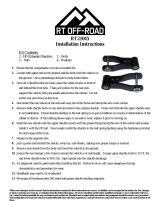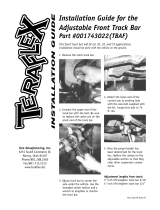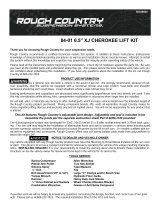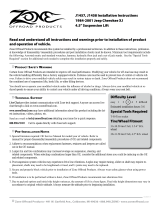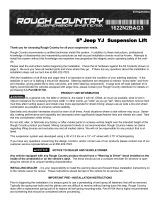
RUBICON EXPRESS 3290 MONIER CIR., RANCHO CORDOVA, CA. 95742 916-473-4600
INSTALLATION INSTRUCTIONS FOR:
RE5520 4.5” YJ EXTREME DUTY LEAF SPRING LIFT KIT
Safety Warning:
Suspension systems or components that enhance the off-road performance of
your vehicle may cause it to handle differently, on and off-road, than it did from
the factory. Care must be taken to prevent loss of control or vehicle rollover
during sudden maneuvers. Failure to drive the vehicle safely may result in
serious injury or death to driver and passengers. We recommend you always
wear your seatbelt, drive safely and avoid quick turns and other sudden
maneuvers. Constant maintenance is required to keep your vehicle safe.
Thoroughly inspect your vehicle before and after every off-road use.
Installation Warning:
We recommend that certified technicians perform the installations of our
products. Attempts to install these products without knowledge or experience
may jeopardize the safety of the vehicle. These instructions only cover the
installation of our products and may not include factory procedures for
disassembly and reassembly of factory components. Read instructions from start
to finish and be sure all parts are present before disassembling the vehicle.
Included instructions are guidelines only for recommended procedures and in no
way are meant to be definitive. Installer is responsible to insure a safe and
controllable vehicle after performing modifications. Do not perform test drives on
public roads with partially completed installations. Always double and triple
check your work before use.
KIT CONTENTS:
1 RE1180 Sway bar disconnect kit
2 RE1454 Front 5-leaf springs
2 RE1455 Rear 6-leaf springs
1 RE1466 Degree shims, 2.5” x 4* aluminum
1 RE1513 Rear brake line
1 RE1555 Front brake lines
1 RE1630 Front track bar bracket
1 RE2100 Transfer case drop kit 1”
1 RE2420 Front u-bolt kit
1 RE2421 Rear u-bolt kit
1 RE 2500 Pitman arm p/s (RE2504 m/s)
1 RE 2766 Front shackle kit
1 RE 2775 Rear shackle kit
1 RE 2790 Main eye greasable bushing kit
REQUIRED TOOLS:
Basic mechanics' tools
Pitman arm puller
Tie rod removal tool
Drill and ½’ bit
Floor jack
Jack stands (2 pair)
INSTALLATION:
Note: For acceptable rear driveline performance we highly
recommend a slip yoke eliminator kit and CV drive shaft be used
with this lift (see slip yoke vibration in “troubleshooting” before
proceeding).
1 Block rear wheels of vehicle.
2 Raise front of vehicle and support frame with jack stands.
3 Remove front wheels.
4 Remove front shocks.
5 Remove axle end of front track bar.
6 Support axle with jack stands.
7 Remove u-bolts & spring plates.
8 Remove springs.
9 Remove shackles and bushings from frame.
10 Remove brake hoses and replace with stainless lines.
11 Lightly grease front shackle and main spring eye bushings.
Main spring eyes use the 9/16” id steel sleeves at military
double wrap end. Front shackles have straight side plates
and include a cross bar and bolt (see photo 1).
12 Install front shackles and springs into vehicle with double
military wrapped end at the frame (see photo 2). The center
pins may come with spacers installed for use w/ floating type
degree shims. Be sure pins don’t bottom out on axle tube
whether using shims or not- remove spacers as required. Do
not fully tighten spring eye or shackle bolts at this time.
13 (See photo 3 for typical installation of steps 13-15) install
new u-bolts with old spring plates. Torque u-bolts to 65-80
ft/lbs, or u-bolt specs if supplied.
14 Install longer front shocks.
15 Install sway bar disconnects.
16 Torque spring eye and shackle bolts. ½” bolts 65-80: ft/lbs.
9/16” bolts: 75-90 ft/lbs.
17 Use tie rod removal tool to remove drag link at pitman arm.
Use puller to remove pitman arm. Install drop pitman arm
and drag link (see photo 4).
18 Install front tires.
19 Lower front of vehicle.
20 Install axle end of front track bar with new bracket. Small
end of new bracket will fit into slot under factory mount (see
photo 5). Drill out old mounting hole to ½” and attach
bracket with supplied bolt. Attach track bar to top hole with
factory bolt.
-REAR AXLE-
21 Block front wheels of vehicle.
22 Raise rear of vehicle and support frame with jack stands.
23 Remove rear wheels.
24 Support rear axle with jack stands.
RI5520 Page 1 of 3

25 Remove shocks.
26 Remove rear track bar. This will not be reused.
27 Remove u-bolts & spring plates.
28 Remove rear springs.
29 Remove factory brake hose and replace with stainless line.
30 Lightly grease and install rear shackle and main spring eye
bushings. Main spring eyes use the 9/16” id steel sleeves at
double military wrap end. Rear shackles have angled side
plates and do not include a cross bar and bolt (see photo 6).
31 Install rear shackles and springs into vehicle with double
military wrap end at the frame (see photo 7). The center
pins may come with spacers installed for use w/ floating type
degree shims. Be sure pins don’t bottom out on axle tube
whether using shims or not- remove spacers as required. Do
not fully tighten spring eye or shackle bolts at this time.
32 If using, insert 4* shim between spring and spring pad on
axle. Thicker end of shim should be at front of vehicle
(pinion points up).
33 Install new u-bolts with old spring plates. Torque u-bolts to
65-80 ft/lbs, or u-bolt specs if supplied.
34 Install longer rear shocks.
35 Torque spring eye and shackle bolts. ½”: 65-80 ft/lbs.
9/16”: 75-90 ft/lbs.
36 If using, install transfer case drop kit by supporting one side
of transfer case with floor jack. Remove hardware from one
side of cross member. Install spacers and new hardware.
Tighten to 55 ft/lbs. Repeat on opposite side.
37 Lower axle so that it is at full droop. Rotate the rear drive
shaft to insure the yokes do not bind. If yokes bind and
shims are installed properly, a slip yoke eliminator and CV
drive shaft are likely required.
38 Lower rear of vehicle.
39 Bleed brake system. Inspect all brake hoses and lines for
leaks, kinks or damage.
40 Grease all zerk fittings on new bushings.
41 Lengthen drag link to center steering wheel.
42 Recheck all bolts - use factory torque specs if not given.
Recheck after 50 miles and then after every off road
excursion.
43 Reminder: Do not reinstall the rear track bar; it will not be
reused.
PHOTO 1
< FRAME END (MILITARY WRAP) – PHOTO 2 – SHACKLE END >
PHOTO 3
PHOTO 4
RI5520 Page 2 of 3

RI5520 Page 3 of 3
PHOTO 5
< KNEE TOWARD FRONT - PHOTO 6 – SHORT LEG TO SPRING >
< SHACKLE END – PHOTO 7 – FRAME END (MILITARY WRAP) >
LIFT KIT TROUBLESHOOTING
REAR DRIVELINE:
Acceleration vibration: Caused by the pinion being too high in relation
to the transfer case output shaft. On leaf sprung vehicles, install axle
shims to lower pinion accordingly.
Deceleration vibration: Caused by the pinion being too low in relation
to the transfer case output shaft. On leaf sprung vehicles, install axle
shims to raise pinion accordingly.
Slip yoke vibration: Caused by excessive angle at the rear transfer case
slip yoke. Very common on vehicles with 2” or more of lift. The transfer
case drop kit and shims provided may be an acceptable temporary fix
(pinion adjustment may also be required- see acceleration and
deceleration vibration troubleshooting above). If this is not acceptable,
a slip yoke eliminator and CV drive shaft is likely required and highly
recommended. Adjust pinion so it is 2 degrees below parallel with CV
drive shaft (see acceleration and deceleration vibration troubleshooting
above). Note that transfer case drop kits can usually be omitted when
using a CV drive shaft.
BUMP STEER:
Caused by improper relationship of drag link and track bar. This is not
typically a problem with the included track bar bracket and drop
pitman arm.
/
